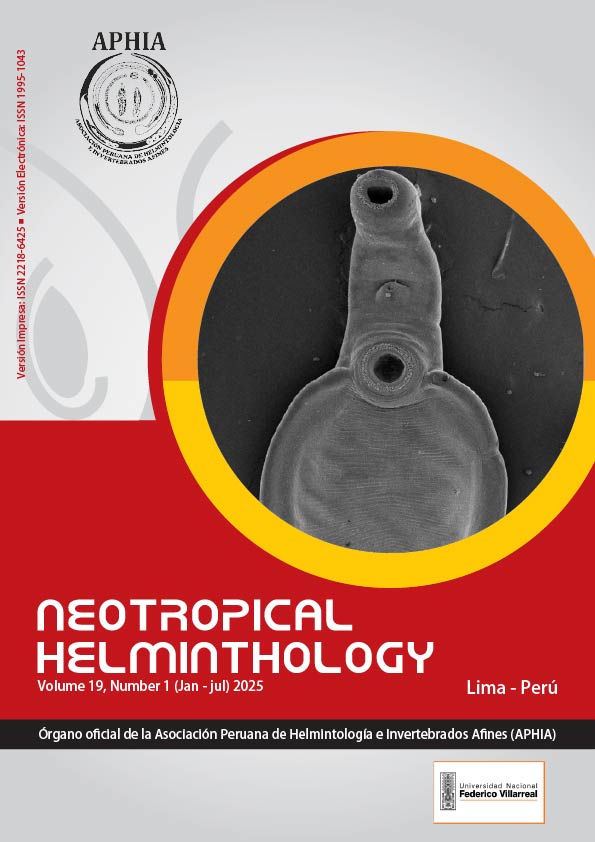MICROSOMACANTHUS HOPKINSI (EUCESTODA, HYMENOLEPIDIDAE) IN NETTA PEPOSACA (AVES, ANATIDAE) IN SOUTH AMERICA
DOI:
https://doi.org/10.24039/rnh2010421096Keywords:
Argentina, Brazil, migratory-flyway, nesting site, rosy billed pochard, wintering siteAbstract
The rosy-billed pochard, Netta peposaca (Vieillot, 1816), is a migratory bird that inhabits wetlands which have the surface covered by abundant vegetation, but also being found in lagoons or rice plantations. One hundred sixty-nine rosy-billed pochards, N. peposaca, were examined for helminths in the Municipalities of Santa Vitória do Palmar and Jaguarão, State of Rio Grande do Sul, Brazil (wintering site) and Alvear, Corrientes Province, northern Argentina (nesting site). Samples were obtained in 2002 and 2004. Birds were frozen in dry ice after collection. During necropsy they were categorized according to sex and maturity, either adult or juvenile. The cestode Microsomacanthus hopkinsi (Schiller, 1951) Spasskaia, 1966 was found in the anterior portion of caeca. Prevalence was 60.9% and mean infection 42.9, while the intensity of infection was 1 to 418 helminths/ host. The high prevalence and intensity of infection may be related to the reproductive strategy of the species that releases the eggs in the form of a single chain.
Downloads
Published
How to Cite
Issue
Section
License

This work is licensed under a Creative Commons Attribution-NonCommercial-NoDerivatives 4.0 International License.
OBJETO: El AUTOR-CEDENTE transfiere de manera TOTAL Y SIN LIMITACIÓN alguna al CESIONARIO los derechos patrimoniales que le corresponden sobre la (s) obra(s) tituladas: xxxxxxxxxxxxxxxx, por el tiempo que establezca la ley internacional. En virtud de lo anterior, se entiende que el CESIONARIO adquiere el derecho de reproducción en todas sus modalidades, incluso para inclusión audiovisual; el derecho de transformación o adaptación, comunicación pública, traducción, distribución y, en general, cualquier tipo de explotación que de las obras se pueda realizar por cualquier medio conocido o por conocer en el territorio nacional o internacional.
REMUNERACIÓN: La cesión de los derechos patrimoniales de autor que mediante este contrato se hace será a título gratuito.
CONDICIONES Y LEGITIMIDAD DE LOS DERECHOS: El AUTOR-CEDENTE garantiza que es propietario integral de los derechos de explotación de la(s) obra(s) y en consecuencia garantiza que puede contratar y transferir los derechos aquí cedidos sin ningún tipo de limitación por no tener ningún tipo de gravamen, limitación o disposición. En todo caso, responderá por cualquier reclamo que en materia de derecho de autor se pueda presentar, exonerando de cualquier responsabilidad al CESIONARIO.
LICENCIA DE ACCESO ABIERTO: El AUTOR-CEDENTE autoriza que manuscrito publicado en La Revista Neotropical Helminthology permanece disponible para su consulta pública en el sitio web https://www.neotropicalhelminthology.com/ y en los diferentes sistemas de indexación y bases de datos en las que la revista tiene visibilidad, bajo la licencia Creative Commons, en la modalidad Reconocimiento-No comercial- Sin Trabajos derivados –aprobada en Perú, y por lo tanto son de acceso abierto. De ahí que los autores dan, sin derecho a retribución económica, a la Asociación Peruana de Helmintología e Invertebrados Afines (APHIA), los derechos de autor para la edición y reproducción a través de diferentes medios de difusión.


 Numero 2 Volumen 19 - 2025 (versión Anticipada)
Numero 2 Volumen 19 - 2025 (versión Anticipada)














































